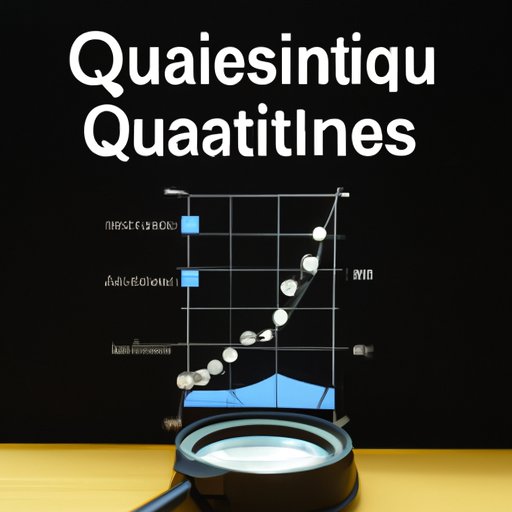Introduction
Quantitative observation is a type of scientific methodology used to measure and record data in order to gain an understanding of the natural world. It is an essential tool for researchers as it helps them understand complex phenomena and make accurate predictions about the behavior of the environment. By collecting and analyzing numerical data, researchers can develop new theories or validate existing ones. This article will explore what quantitative observation means in science and how it is used in various fields of study.
Understanding Quantitative Observation in Science
Quantitative observation is an important part of scientific investigation, as it helps researchers understand the natural world. Through the process of collecting and analyzing numerical data, researchers can draw conclusions about the behavior of the environment and make accurate predictions about future events. For example, by measuring the temperature of the ocean over time, scientists can predict the likelihood of certain weather patterns occurring in the near future.
Quantitative observation can also be used to gain insight into complex phenomena. By making precise measurements and observations, researchers can uncover patterns and relationships that are otherwise difficult to detect. For instance, by tracking the movements of birds over a period of time, scientists can observe the behavior of flocks and draw conclusions about the interactions between individual birds.
In addition to providing insight into the natural world, quantitative observation can be used to make accurate predictions in science. By measuring and recording data, researchers can develop models that can accurately predict the behavior of the environment. For example, scientists use climatic models to make predictions about the effects of climate change on the Earth’s ecosystems. These models rely on quantitative observations of temperature, precipitation, and other environmental variables.
Finally, quantitative observation plays an important role in scientific analysis. By collecting and analyzing data, researchers can determine the validity of theories and hypotheses. For example, scientists use statistical methods to analyze the results of experiments and determine whether their hypotheses are supported by the data. This type of analysis is essential for advancing scientific knowledge and developing new theories.
Conclusion
In conclusion, quantitative observation is an essential tool for scientific research and analysis. By making precise measurements and recording data, researchers can gain an understanding of the natural world and make accurate predictions about the behavior of the environment. Additionally, quantitative observation plays an important role in scientific analysis, helping scientists validate theories and develop new ones. Overall, quantitative observation is an invaluable tool for researchers seeking to advance our knowledge of the natural world.
Summary of Key Points
- Quantitative observation is a type of scientific methodology used to measure and record data in order to gain an understanding of the natural world.
- Quantitative observation can help us understand complex phenomena and make accurate predictions about the behavior of the environment.
- It plays an important role in scientific analysis, helping scientists validate theories and develop new ones.
Recommendations for Further Study
Given the importance of quantitative observation in scientific research and analysis, further study is needed to better understand its role in various fields of study. For instance, more research is needed to examine the effectiveness of different methods of quantitative observation and their ability to provide reliable results. Additionally, there is a need for more research into the implications of quantitative observation for the accuracy of predictions made in science. Finally, additional studies should be conducted to determine how quantitative observation can be used to improve our understanding of the natural world.
(Note: Is this article not meeting your expectations? Do you have knowledge or insights to share? Unlock new opportunities and expand your reach by joining our authors team. Click Registration to join us and share your expertise with our readers.)
